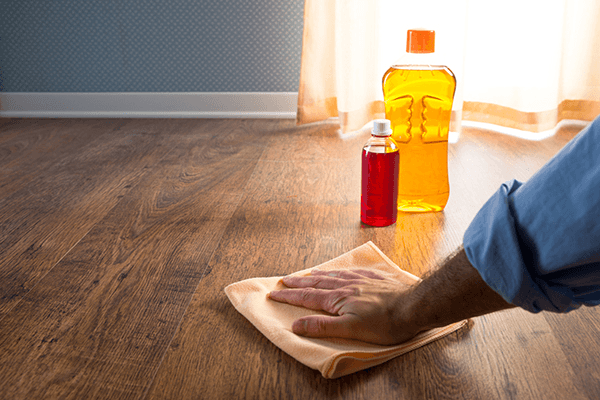The process of maintaining and cleaning hardwood floors is quite challenging – you can’t just sweep and wipe them using water and soap and call it a day – as you would with linoleum and tile floors. Many commercial floor cleaning solutions will likely strip the wood, which leaves you with brittle, dull, and dry surfaces that have lost their luster, while water will lead to buckling and warping of the wood. You want to preserve the integrity of your floor as long as possible, and homemade hardwood cleaners are actually quite effective, cheaper, and are environmentally friendly compared to many commercial cleaners.
One of these DIY solutions is a vinegar and olive oil mixture, which you can use to make your hardwood floors shine with ease. In fact, you won’t even need to spend money buying expensive cleaners when you can make this great homemade solution. If you want the floor to smell even better (since vinegar can have quite a strong smell that isn’t exactly the most pleasant smell), just add some lemon essential oil.
Making Wood Floor Cleaner Polish
Making this solution is actually very easy, and you’ll need the following ingredients:
- 1/3 cup of white vinegar
- 5 cups of hot/warm water (this dilutes the effects of the vinegar)
- ¼ cups olive oil
- 12 drops of lemon essential oil (optional, smells great)
Making the Solution
- Clean your hardwood floor thoroughly and remove all debris, dust, and dirt from it (use a broom with soft bristles, or a vacuum cleaner), then remove any fine particles using a dust mop.
- Pour two cups of the oil and the white vinegar each, as well as the water and essential oil, in a spray bottle. Make sure the bottle is very clean, as you need the solution to be as clean as possible. Seal the bottle as tightly as possible, then shake the mixture thoroughly to blend. This is because the solution lacks chemical binders that are a common feature of commercial solutions, so the ingredients will naturally separate as you use them.
Polishing the Floor
- Clean the floor in small sections at a time. Make sure to spray a little cleanser solution to create a thin coat on the specific area you are cleaning.
- Use a microfiber cloth to rub the polish into the floor in circular motions. Good news though – you won’t need to rinse the floor after you’re done! The water and vinegar will clean and disinfect the floor, while the olive oil will restore its shine.
- Allow the whole area to dry. Ideally, it should be thirty minutes at most or slightly less, unless you used too much cleaner. If the drying time is extremely short, such as five minutes, then that means you didn’t use enough cleaner.
If you want to do a deeper cleaning session, you can still use a hyper-concentrated version of the cleaners, which only contain floor protectant and fragrance. While using the microfiber cloth, put some oil in the cloth directly, then work it into the floor in circular motions, as if you are waxing the surface. However, be careful to not add too much oil, or else the floors will become too slick or greasy.
Other Solutions That Work
Vegetable Oil Cleaner
In most cases, water does not work well for a wood floor, so you can use a vegetable oil cleaner solution instead. The oil will work well in preserving the finish of the floor and leave it looking new and shiny.
If you will use this specific approach, you can combine 2 cups of white vinegar with 2 cups of vegetable oil in a spray bottle, then spray it on the floor while wiping it down using a microfiber cloth. Afterwards, use a separate dry cloth to wipe it off after some time.
Black Tea Cleaner
Yes, it’s possible to use black tea to clean hardwood floors, which has been done for many years. However, keep in mind that black tea is not the best option for a laminate floor.
Boil a pot of water, then add five or six bags of black tea and ten minutes for steeping. Then, pour this in your bucket and use that to mop the floor.
Dish Detergent Cleaner
If the floor is rustic or a traditional wood, you can use dish detergent. To make it, mix a ½ cup of distilled white vinegar and a gallon of water, then add some drops of dish detergent for a great and fresh scent.
Plant-Based Soap
This is a natural, environmentally-friendly option if prefer to not use dish detergent. Plus, it’ll also preserve the integrity of your floor.
Final Thoughts
Using a mixture of vinegar and olive oil for your hardwood floor is great, but there are additional alternatives to explore. The most important thing is that it’ll keep the floors clean while preserving their integrity, keeping them looking newer for longer.
Everyone loves floors that continue to shine, even after years and years!

I just followed your instructions and gave my hardwood floors a much needed clean, and they came out AWESOME! Just wanted to drop by and say thanks! :)))
You’re very welcome.